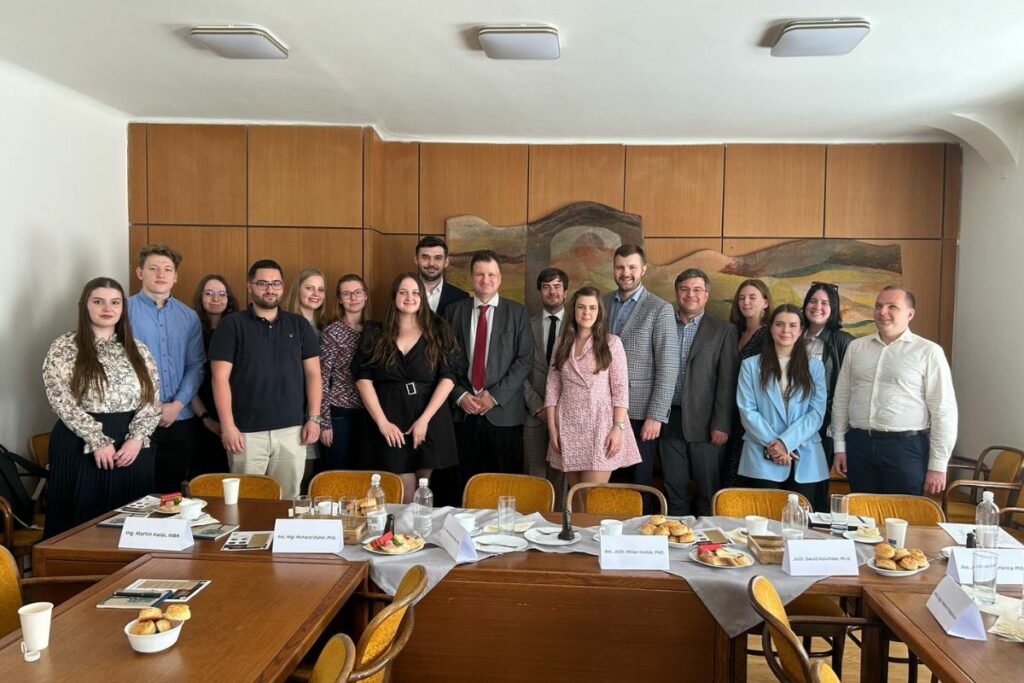
On April 24, 2025, the Institute of Philosophy (FiÚ) SAS hosted an expert conference dedicated to the 50th anniversary of the Helsinki Conference – Changes to the Constitution and the Problem of Autonomy with Regard to Human Rights. The event focused on current issues of constitutional changes and their consequences on civil liberties. The conference was covered by the director of the Faculty of Philosophy of the Slovak Academy of Sciences, doc. Mgr. Richard Stahel, PhD., and unofficially also the Ambassador-designate of the Slovak Republic to the Czech Republic prof. Dr. Phil. Martin Muránsky, PhD.
The event was held as part of the VEGA research project focused on the relationship between individual and collective autonomy. Among the main speakers were experts in the field of law and philosophy from several Slovak and Czech universities.
The conference was opened by the State Secretary of the Ministry of Justice of the Slovak Republic, doc. Milan Hodás, PhD., who dealt with the issues of multi-level constitutionalism and the interaction of national and supranational legal systems. He pointed out the importance of constitutional dialogue in the protection of fundamental rights and the material core of the Constitution in the context of Slovakia’s membership in the EU and clarified possible sources of tension between legal systems at several levels. From the point of view of the planned changes to the Constitution of the Slovak Republic, this topic is very topical.
The contribution of doc. Branislav Fábry, PhD., analysed the development of the Slovak constitution, its flexibility and the importance of clarity in its amendments, as well as the possibilities and limits of its modifications. He said that “the clarity of constitutional changes is a very important qualitative feature and part of the protection of constitutional identity.” He added that at the time of the creation of the Constitution of the Slovak Republic, there was an assumption that took into account the dynamics of the establishment of the republic and the Constitution of the Slovak Republic. For that reason, it was possible to assume that it would be supplemented, to which it also attributes the essentially flexible possibility of the conditions for its amendment, which is still valid today.
Lecture by doc. Ján Štefanica, PhD., pointed out that the Helsinki Conference, known as the Conference on Security and Cooperation in Europe, was held in 1975 in Helsinki, Finland, and represented an important diplomatic and political milestone during the Cold War. Its main result was the Helsinki Final Agreement, which, although not legally binding, had a strong social dimension. An example is the situation in Czechoslovakia at the time – the conclusions of the conference were also referred to by the leadership and members of Charter 77. Associate Professor Štefanica stated, among other things: “It was the commitment to human rights and individual autonomy in civil and political society that later became an important argument for dissent in the Eastern Bloc.”
In his speech, Ambassador Martin Muránsky introduced the VEGA project, within which the conference was held, and clarified its connection with the conference. Following on from previous contributions, he drew attention to the philosophical aspects of sovereignty and human rights as the ideological basis of a modern democratic state. He pointed out that in this conceptual framework, human rights are not only seen as a set of individual entitlements, but also as “an expression of the spirit of public freedom that legitimizes power and at the same time limits it.” Martin Muránsky emphasized the need to enrich scientific and public discourse with the legal, philosophical and historical dimensions of the concept of human rights.
In the afternoon, there was an invited lecture by David Kolumber, Ph.D., from Masaryk University Human Rights and Their Normative Sources in Czechoslovakia. In it, he presented the development of human rights in our territory from Austria-Hungary to Czechoslovakia. He showed how historical legal documents influenced the level of protection of human rights in the period of the First Republic.
The program also included a lively discussion involving academics, doctoral students, students and practitioners, including lawyer Mgr. PhDr. Helena Drappanová, who provided an insight into legal practice in the field of human rights protection. The specific consequences of constitutional changes on everyday life, as well as ecological rights, were discussed.
The conference confirmed the need for an interdisciplinary approach to the issue of constitutionality and the rule of law and opened up space for the continuation of professional dialogue in the international context. The established international cooperation will continue with the next round of the conference, which will take place in the Czech Republic.
Edited by: Jakub Švec, Institute of Philosophy SAS, v. v. i.
Photo: FB of State Secretary Milan Hodás, Jakub Švec, FiÚ SAS, v. v. i.



